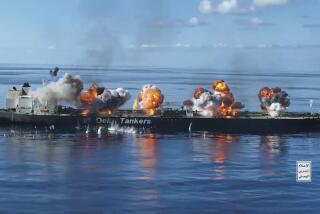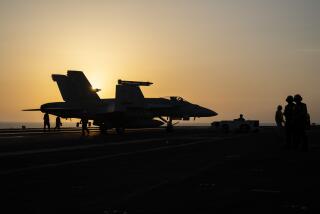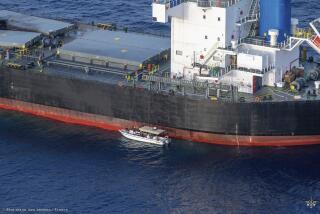Mine Found in Path of U.S.-Escorted Ship
MANAMA, Bahrain — U.S. warships on Tuesday escorted a Kuwaiti tanker southward toward a major Persian Gulf shipping channel where British minesweepers spotted at least one mine, believed planted by Iran, witnesses and shipping sources said.
Meantime, suspected Iranian Revolutionary Guards attacked a Greek-flagged tanker in the southern gulf on Tuesday night, just hours after Iraqi warplanes set an Iranian oil tanker aflame in the north, shipping officials reported.
The suspected mine was discovered Tuesday by the British minesweeper Bicester off the coast of the United Arab Emirates, in the same area where the U.S. Navy destroyer Kidd reported sighting several mines on Sunday, at the southern end of the Persian Gulf near the Strait of Hormuz.
Searching Channel
Television crews buzzing the narrow sea lane between Dubai and Abu Musa, a small island where Iranian Revolutionary Guards maintain a naval base, said they saw sailors from the Bicester drop a marker buoy to warn shipping that a mine could be below the surface.
The Bicester, along with two other British minesweepers, on Tuesday at the request of the United States began searching for mines in the channel, through which all deep-draft tankers must pass.
The frigate Andromeda and a supply vessel, the Abdiel, accompanied them. A fourth minesweeper, the Brocklesbury, remained in the Gulf of Oman to the south.
Diplomatic sources said French warships also may be sent into the gulf to provide protection for the vulnerable British vessels.
The French minesweepers had been expected to remain in the Gulf of Oman, but a French diplomat in the region said “there is some movement” and that it is “highly possible” French navy vessels would assist. It would be the first such joint operation in the gulf.
The mine threat may slow the 10th U.S.-escorted convoy of reflagged Kuwaiti vessels, which got under way late Monday night. However, in Washington, Pentagon spokesman Fred Hoffman said that the reflagged Gas Prince, which is carrying liquefied natural gas, and the guided missile frigate Hawes were proceeding “uneventfully” through the central part of the Persian Gulf.
Not far from the suspected mine area, a Greek tanker was attacked in the gulf Tuesday night by an Iranian gunboat, but there were no casualties or fire aboard the vessel, marine salvage executives said.
The 38,689-ton Koriana sent a distress signal saying it had been “attacked by missiles” and that it planned to anchor for the night near the site, 50 miles north of Abu Dhabi, the executives said. Lloyd’s Shipping Intelligence in London confirmed the attack and said the ship’s agent was Lykiardopulo and Co., Ltd. of London.
In the northern gulf off the coast of Iran, Iraqi warplanes attacked the Iranian tanker Khark, setting it on fire, regional shipping sources in Bahrain said. It was the sixth Iranian tanker hit in three days.
Iraq also said its warplanes bombed a weapons factory near Tehran, a large power plant near the Iran-Soviet border and an oil-pumping station in the south.
Iraqi Raids Confirmed
Iran’s official Islamic Republic News Agency said a number of people were killed in the raids and in Iraqi shelling of the southern cities of Khorramshahr and Abadan. It said Iranian artillery shelled the southern Iraqi port city of Basra in retaliation.
The United States began to escort 11 Kuwaiti tankers through the gulf in July to protect them from attack by Iran, which considers Kuwait an ally of Iraq in the seven-year-old Iran-Iraq War. Kuwait insists it is neutral.
On Sept. 21, the Navy attacked the Iran Ajr, saying it was caught in the act of laying mines. Iran, which has vowed revenge, Tuesday called on the United Nations to condemn the U.S. attack, saying it has created a “dangerous and explosive state,” Tehran radio said.
More to Read
Sign up for Essential California
The most important California stories and recommendations in your inbox every morning.
You may occasionally receive promotional content from the Los Angeles Times.










